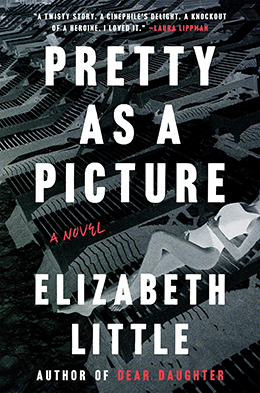Typically, when a reviewer says a book is cinematic, it is a reference to the fact that the book could easily be adapted to the screen and would probably be successful if that happened. In the case of Elizabeth Little’s second novel, Pretty as a Picture, the term cinematic is more of an all-encompassing term intended to describe the entire ambience of the book – everything here is centered around the film-making industry: the plot, the characters, the setting, the crime(s), the motives, the history, the tone, the style, the very essence of the novel. And yes, it would also make a good movie, so the traditional meaning still applies.
Pretty as a Picture’s lead character is Marissa Dahl, a film editor who is quietly making a name for herself within the filmmaking community. When she discovers that her latest secret assignment requires working with one of the most demanding directors in the industry, Tony Rees, she weighs those challenges against the career-boon certain to result from such a high-profile production. Needless to say, Marissa packs her bags and sets off to the mysterious shoot location, which turns out to be an exclusive island off the coast of Delaware.
Marissa quickly learns that the movie is based on a true crime that happened many years earlier on this island. Once on set, Marissa begins to feel that there is more going on than just the making of this movie. Why are the actors behaving so strangely? Half of the crew has quit and the other half seems on the verge of walking at any moment. Marissa cannot seem to obtain the necessary information she needs about the previous film-editor, the person she is replacing. Why did he leave? And where can she find the film footage he has already edited?

When Marissa encounters two precocious children, she discovers they both have noticed some odd things as well and have taken to investigating like two budding Nancy Drew-acolytes should. When events on the island take a very serious turn, Marissa joins them in a hunt for a killer, hopefully before she herself becomes the next victim.
Elizabeth Little is one of those writers who nails the idea of celebrity, the all-consuming gossip and scrutiny that comes with the limelight, and the melancholy that results when isolation becomes a defense mechanism. Certainly not one be derivative, Little packs Pretty as a Picture with enough secrets, scandals, and revelations to fill several Hollywood studios. In a unique juxtaposition, Elizabeth Little’s literary voice feels both fresh and modern even while it evokes this retro vibe of nostalgia and yesteryear. The inclusion of a true-crime podcast element that occasionally interrupts the narrative further solidifies Pretty as a Picture as a work very much rooted in the zeitgeist of contemporary culture.
As she did in her debut, Dear Daughter, Elizabeth Little skillfully crafts characters readers care about. It’s refreshing that Marissa Dahl avoids the stereotype of being an unreliable narrator. Despite her quirks, readers will immediately bond with Marissa. Film buffs will especially enjoy her tendency to resort to classic cinema allusions when trying to express her emotions. Reading Pretty as a Picture is sure to have many running off to stream the various movies mentioned throughout the novel. There are even some fascinating tidbits about what the work of a film editor entails and how that factors into the overall movie-making process.
Pretty as a Picture is the type of crime novel genre fans will praise and fete for years to come. Both the slower structure that builds on the information the reader learns along the way, culminating in an effective, believable, and satisfying concluding panorama and the ability to create inimitable characters of depth who display both wit and wonder, reflect a writer working at the top of her craft. Pretty as a Picture is a timely work with timeless appeal; a true highlight of early 2020.
BUY LINKS: Pretty as a Picture by Elizabeth Little
______________________________________________________________________
Disclaimer: A print galley of this title was provided to BOLO Books by the publisher. No review was promised and the above is an unbiased review of the novel.
